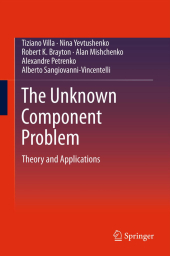 Neuerscheinungen 2014Stand: 2020-02-01 |
Schnellsuche
ISBN/Stichwort/Autor
|
Herderstraße 10
10625 Berlin
Tel.: 030 315 714 16
Fax 030 315 714 14
info@buchspektrum.de |

Robert K. Brayton, Tiziano Villa, Nina Yevtushenko
(Beteiligte)
The Unknown Component Problem
Theory and Applications
2012. 2014. xvi, 312 S. 2 Tabellen. 235 mm
Verlag/Jahr: SPRINGER, BERLIN; SPRINGER US 2014
ISBN: 1-489-97394-X (148997394X)
Neue ISBN: 978-1-489-97394-8 (9781489973948)
Preis und Lieferzeit: Bitte klicken
The Problem of the Unknown Component: Theory and Applications addresses the issue of designing a component that, combined with a known part of a system, conforms to an overall specification. The authors tackle this problem by solving abstract equations over a language. The most general solutions are studied when both synchronous and parallel composition operators are used. The abstract equations are specialized to languages associated with important classes of automata used for modeling systems.
The book is a blend of theory and practice, which includes a description of a software package with applications to sequential synthesis of finite state machines. Specific topologies interconnecting the components, exact and heuristic techniques, and optimization scenarios are studied. Finally the scope is enlarged to domains like testing, supervisory control, game theory and synthesis for special omega languages. The authors present original results of the authors along with an overview of existing ones.
1. Synopsis.- 2. Equations over Languages and Finate Automata.- 3. Equations over Finite State Machines.- 4. Equations Over w-Automata.- 5. A Survey of Relevant Literature.- 6. Implementation of Automata Manipulations.- 7. Manipulations of FSMs Represented as Sequential Circuits.- 8. The Software Package BALM.- 9. Fundamental Operations in BALM.- 10. Computation of Flexibility in Sequential Networks.- 11. Computation of Sequential Flexibility in Netlists by Windowing.- 12. Computation of Sequential Flexibility in Networks of FSMs by Windowing.- 13. Language Solving Using Simulation Relations.- 14. Exploitation of Flexibility in Sequential Networks.- 15. Supervisory Control.- 16. Testing.- 17. Synthesis of Strategies for Games.- 18. Extending BALM to Synchronous Equations Over co-Büchi Specifications.- 19. Conclusions and Open Problems.
From the reviews:
"Synthesis is a hard computational area that is now becoming accessible, thanks to increasing computational power. It is good to have a book from experts that surveys the techniques available." (K. Lodaya, ACM Computing Reviews, November, 2012)
The authors of this book cast the problem as solving abstract equations over language and study the most general (largest) solutions under the synchronous and parallel composition operators. They also apply such equations to languages associated with important classes of automata used for modeling systems, e.g., regular languages as counterparts of finite automata, FSM languages as counterparts of FSMs. The authors investigate the largest subsets of solutions closed with respect to various language properties; in particular, classes of the largest compositional solutions (defined by properties exhibited by the composition of the solution and of the context). The first algorithm to compute the largest compositionally progressive solution of synchronous equations is provided. This approach unifies in a seamless frame previously reported techniques.


